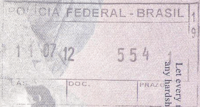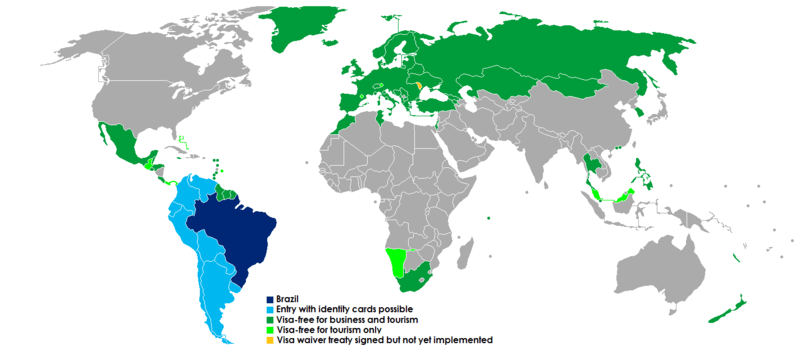Visa policy of Brazil


Visitors to Brazil must obtain a visa from one of the Brazilian diplomatic missions unless they come from one of the visa exempt countries. Brazil maintains a fully reciprocal visa policy.
Visa policy map

Visa exemption
Holders of passports of the following 90 jurisdictions do not require a visa to visit Brazil up to 90 days for tourism or business purposes (unless otherwise noted). An identity document is accepted instead of a passport in some cases.[1][2]
ID - May enter with an ID card.
T - Visa-free for tourism purposes only.
1 - For a stay of up to 30 days.
2 - For a stay of up to 60 days.
3 - For a stay of up to 90 days within any 180 day period (the 180 day period limitation does not apply to citizens of Croatia, Ireland, Poland, Portugal and United Kingdom).
4 - For a stay of up to 90 days within one year period
Out of visa exempt nationalities, diplomatic and official/service passport holders of Liechtenstein, New Zealand and Singapore passports require a visa.
Nationals of ![]() Spain are specifically required to hold proof of sufficient funds of at least R$170 per day, proof of confirmed hotel accommodation (paid or guaranteed by credit card) or a notary certified invitation letter from a resident of Brazil, and documents required for their next destination. Those traveling on business are exempt from these requirements when holding an original letter from their company, stating the purpose of the visit.[2]
Spain are specifically required to hold proof of sufficient funds of at least R$170 per day, proof of confirmed hotel accommodation (paid or guaranteed by credit card) or a notary certified invitation letter from a resident of Brazil, and documents required for their next destination. Those traveling on business are exempt from these requirements when holding an original letter from their company, stating the purpose of the visit.[2]
Only holders of diplomatic or official/service passports of Algeria, Angola, Azerbaijan, Belarus, Benin, Botswana, Burkina Faso, Burundi, Cambodia, Cameroon, Cape Verde, China, Congo, Cote d'Ivoire, Dominican Republic, Egypt, Equatorial Guinea, Ethiopia, Gabon, Ghana, Guinea-Bissau, Haiti, India, Indonesia, Japan, Jordan, Kazakhstan, Kenya, Laos, Mali, Mauritania, Moldova, Mozambique, Myanmar, Nepal, Nicaragua, Nigeria, Qatar, Saint Lucia, Sao Tome and Principe, Senegal, Sri Lanka, Sudan, Tanzania, Vietnam and Zambia and of diplomatic passports of Cuba, Iran, Pakistan and Uzbekistan do not require a visa.
Brazilian nationals must enter and leave Brazil with their Brazilian passport or Brazilian identity card, even if they also hold a passport of another country.[4]
Future
Brazil signed visa waiver agreements with the following countries, but they are pending ratification or implementation.
| Country | Date of agreement | Purpose | Length of stay |
|---|---|---|---|
| 9 December 2013[5] | Tourism or business | 90 days per 6-month period |
Visa types and requirements

A full list of the types of Brazilian visas can be found on a Brazilian Consulate's website.[6]
Tourist visa
Eligibility
- Tourists
- People visiting relatives or friends
- Unpaid participation in athletic or artistic event or competition. An invitation letter from the sponsoring organization in Brazil is required.
- Unpaid participation in a scientific/academic seminar or conference sponsored by a research or academic institution. An invitation letter from the sponsoring organization in Brazil is required.
Terms and Conditions
- Tourist visa holders are prohibited from engaging in business, work, or academic activities in Brazil.
- For citizens of some countries, the first arrival in Brazil must take place within 90 days from the date the visa was issued.
- This visa is good for multiple entries within the visa's duration. Even when the validity of the visa exceeds 90 days, authorized stays are for a maximum of a 90-day period per visit. If necessary, an extension may be submitted to the Federal Police in Brazil, if requested prior to the expiration of the authorized stay (special requirements apply). Tourist visa holders are allowed to stay in the Brazilian territory a maximum of 180 days over a 12-month period.
- For citizens of some countries without diplomatic relations with Brazil, such as Western Sahara, but not Kosovo or Taiwan, a visa is issued on a laissez-passer instead of a passport.[1]
Short-stay business visa
People wishing to visit Brazil for a short period for the purpose of making or meeting with business contacts, attending trade fairs, speaking at conferences etc. are required to apply for a short-stay business visa, which is also valid for a stay of up to 90 days.
Temporary residence visa/work visa
Foreigners wishing to live and work in Brazil are required to apply for a temporary residence visa. To obtain a temporary visa for employment purposes, the worker needs to secure a job offer from a Brazilian company or government department, or a foreign company based in Brazil, and the company is required to apply to the Immigration Division of the Ministry of Labor on the worker's behalf.[7] The criteria for approval of an employment visa include suitable educational qualifications or work experience, a secured employment contract in Brazil, proof of adequate means of subsistence in Brazil, police confirmation that the worker has no criminal record, and a satisfactory medical examination. All official documents must be translated into Portuguese and 'legalized' by the consulate.[8] The application processing period is normally around 2-3 months. Employment visas are issued for a specific job, and are not transferable between employers in Brazil without permission. Visas are also issued to the employment visa holder's spouse and children.
Permanent visas
There are seven categories of application for a permanent visa to live and work in Brazil. These include marriage and family unification categories, as well as categories covering business executives and entrepreneurs, high level specialists, investors and retired people.
Business people and professionals
Permanent visas are issued to administrators, managers and directors of professional or business corporations, who are already employed by the company and are moving to Brazil on intra-company transfer. There is a minimum requirement for the parent company to invest at least US$200,000 per visa in the Brazil-based subsidiary, and to provide evidence that they are bringing value to Brazil in the form of increased productivity, technology transfer or social benefits. Visas are also issued to administrators, managers or directors of start-up companies, who are not required to meet the minimum investment or job creation criteria which apply to established companies. Researchers or other high-level specialists employed by Brazilian research institutions may also be granted a permanent visa.
Investors
Resident investor status is granted to foreign nationals who invest a minimum of BRL$150,000 in a new or existing Brazilian corporation assuming the investor has no criminal record. Investment funds must be submitted through the Central Bank of Brazil. Investor visas are issued for an initial 3-year period, renewable on approval of satisfactory accomplishment of the corporation's social contract, on confirmation that the corporation has created a job or jobs for Brazilian nationals, and on confirmation that the corporation has paid taxes. After renewal, Investor Visas become permanent, and remain in force as long as the corporation is in operation and the investor maintains his or her investment in the corporation above BRL$150,000. Resident investors can apply for Brazilian citizenship after 4 years if they can read and write Portuguese; prior to this they have most of the rights of citizens, except for voting rights, gun ownership rights, the ability to own large farms or beachfront property, and various minor rights. If a foreign national with a permanent residency visa applies for citizenship, it will not be approved before residing in Brazil for 5 years, and if the foreign national cannot speak Portuguese, they cannot become a citizen for 15 years. More information can be obtained by contacting your local Brazilian Consulate or at consulatebrazil.org
Retired people
Foreign nationals aged over 60 can apply for a permanent visa if they have a pension of at least US$2,000 per month and will transfer it to Brazil every month. Visas may also issued to dependants, but there is a requirement to transfer an additional US$1000 of pension per dependant per month. Documentary proof of the pension and a bank declaration authorizing the monthly transfer are required. Applicants for permanent residence visas are required to submit their passport, birth certificate, marriage certificate (if applicable) and a police certificate of no criminal record, issued within the last 90 days. Unfortunately, starting in 2014, retirees with serious health problems have been denied visas even if they have a sufficient pension because some have abused Brazil's free and universal health care by coming to Brazil with a retirement visa for the sole purpose of obtaining health care.
Registration
On arrival in Brazil, any holders of visas for more than 90 days duration are required to register with the Federal Police, and obtain an identity card. Upon applying, visa holders are issued a slip of paper called a "protocol" while their RNE card is processed, which may take more than two months. The Federal Police have offices in all international airports. Those intending to work in Brazil must obtain a work card from the Labor Department and a tax identification card from the Ministry of Finance.
Citizenship
Foreign nationals can apply for Brazilian nationality by naturalization if they have lived in Brazil for a continuous period of at least four years, have no criminal record, and can read and write Portuguese, among other requirements. The residency period can be reduced to only one (for nationals of Portuguese-speaking countries), two or three years in some cases, and there are fewer requirements for those who have lived in Brazil for at least fifteen years.[9]
See also
References
- 1 2 Entrance Visas in Brazil, Ministry of External Relations of Brazil, October 21, 2016.
- 1 2 "Visa Information". Timatic. IATA. Retrieved 27 October 2016.
- ↑ Agreement between the European Union and the Federative Republic of Brazil on short-stay visa waiver for holders of ordinary passports, European Union. This treaty does not apply to the United Kingdom and Ireland, but these countries also have separate visa waiver agreements with Brazil.
- ↑ Tourist Visa, Consulate-General of Brazil in Houston.
- ↑ Republica Moldova şi Brazilia au semnat Acordul privind călătoriile fără vize
- ↑ Types of Visa, Consulate General of Brazil in Boston.
- ↑ Ministry of Labor of Brazil.
- ↑ http://wnfaulkner.wordpress.com/2013/04/14/getting-a-brazilian-work-visa-a-ballad-of-bureaucratic-intrigue/ A detailed anecdotal account of this process by a U.S. citizen
- ↑ Types of Brazilian Naturalization, Ministry of Justice of Brazil. (Portuguese)